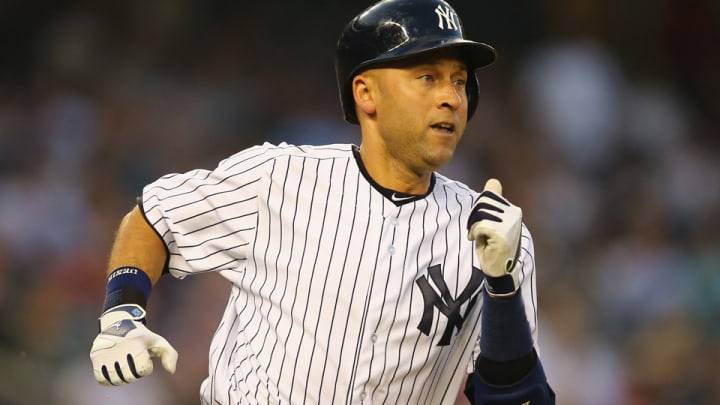Derek Jeter not up to usual standards but better than most 40-year-old SS

On its face, Derek Jeter's performance thus far has supported his decision to retire at the end of the year. Leaving out his cup of coffee in 1995 and his injury-plagued 2013, this has been the worst season of the now-40-year-old Jeter’s career. All three components of his .268/.324/.327 slash line and his 83 OPS+ stand as career lows, as do his .059 isolated slugging and range factor afield. But as Jeter muddles through his 20th and final season, he is actually having one of the greatest age-40 seasons by a shortstop in major league history.
That’s largely due to the fact that 40-year-old shortstops are an extreme rarity. Since the creation of the American League in 1901, just 19 men, including Jeter, have played even a single game at shortstop in or beyond their age-40 season (baseball ages are determined by a player’s age on June 30 of the season in question). That Jeter has already played 64 games at short this year, starting at the position in 63 of them, puts him on a far shorter list of just five men who played 60 or more games at short in their age-40 seasons or later. The others on that list are Hall of FamersHonus Wagner, Luke Appling and Barry Larkin, and the not-yet-eligible but sure to be hotly debated Omar Vizquel. If Jeter can get to 94 games at the position this year, he’ll be on an even shorter list, one that consists of just five player seasons: Two by Wagner, two by Appling and one by Vizquel, in 2007.
What’s more, Jeter is currently out-hitting the age-40 seasons of both Vizquel and Wagner. Of course, in the context of dead-ball 1914, Wagner’s .252/.317/.317 performance that year was actually superior to Jeter’s current line, and Wagner rebounded from that performance to post higher OPS marks in his final three seasons than he did at age 40. However, Jeter is legitimately out-producing Vizquel’s age-40 season, when, as the Giants’ starting shortstop, he hit a mere .246/.305/.316. Vizquel started 136 games at short that season and played his usual sparkling defense, but it’s not outside the realm of possibility for Jeter to finish this year having been more valuable than Vizquel (0.6 WAR, according to Baseball Reference) was that year. If that’s the case, Jeter could be in the middle of the fifth-greatest age-40 season by a shortstop in major league history.
Jeter is also exceeding expectations on two fronts. First of all, he has been healthy. Given the fact that the broken left ankle he suffered during the 2012 American League Championship Series never seemed to heal fully last year (soreness in that ankle ended his 2013 season in early September) and that he has hit the disabled list with muscle strains in his right leg three times in the last three years, the biggest challenge he faced coming into this season appeared to be simply staying on the field. Thus far, however, he has avoided a disruptive injury. Some of the credit for that can be given to Yankees manager Joe Girardi, who has allowed Jeter to start at shortstop on seven consecutive days just once all season, though Jeter can share the credit for allowing Girardi to handle him that way after a career of demanding to play through injuries.
Jeter has also exceeded expectations defensively. To those with a realistic understanding of his past limitations at his position, the idea of a 40-year-old Jeter remaining at shortstop after a series of leg injuries sounded like a disaster waiting to happen. But despite his lousy range factor, Jeter has thus far acquitted himself well, according to the same defensive statistics that often said he was the worst-fielding shortstop in baseball in his prime. Defensive Runs Saved rates Jeter as average defensively this season, while Ultimate Zone Rating considers this Jeter’s best season at short since 2010, when he won the last of his five utterly undeserved Gold Gloves. Baseball Prospectus’ Fielding Runs Above Average is less sanguine, but still rates Jeter as better in the field than in his prime seasons, when, according to FRAA, he consistently cost the Yankees two wins a year in the field relative to an average shortstop (while contributing something around six wins above replacement with his bat and legs, of course).
The end result, however, is still an overall performance close to replacement level. Jeter's 0.6 bWAR makes him slightly less valuable than infield partners Brian Roberts (0.9) and YangervisSolarte (0.8) so far this season, the latter of whom was the definition of a replacement player coming into the season as minor league free agent. That only goes to underscore just how valuable Jeter was in his prime. Simply replacing this year’s Jeter with the player he used to be would be enough to bring the third-place Yankees, currently 2 1/2 games out of first, even with the Blue Jays atop the American League East. Unfortunately for Jeter and New York, however, time only marches forward.
